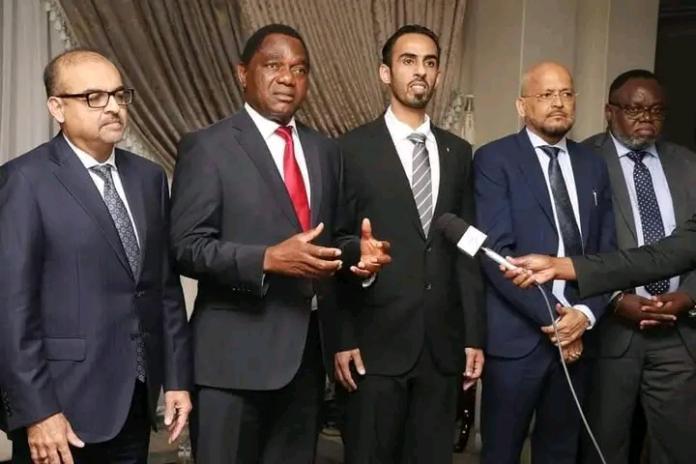Africa-Press – Zambia. Scandal of Mopani Copper Mine Sale, this is what must be done
The scandal surrounding the sale of Mopani Copper Mines (MCM) in Zambia highlights systemic issues of corruption, legal violations, and governance failures.
1. Legal and Constitutional Remedies
Nullify the IRH Sale: Challenge the legality of the IRH deal in court for violating *Article 210* of Zambia’s Constitution, which mandates parliamentary approval for major state asset sales. Advocate for judicial review to annul the transaction if constitutional breaches are proven.
Parliamentary Intervention: Demand a parliamentary vote retroactively, requiring the government to submit the IRH deal for scrutiny. A two-thirds majority vote could reject the sale, forcing a restart of the process.
2. Governance and Institutional Reforms
Independent Oversight: Strengthen ZCCM-IH’s board independence by appointing non-political, technically qualified members. Implement safeguards to protect boards from political interference (e.g., fixed tenures, performance-based appointments).
Anti-Corruption Investigations: Task Zambia’s Anti-Corruption Commission (ACC) and international bodies (e.g., UN Office on Drugs and Crime) to investigate alleged collusion between state officials and IRH. Prosecute culpable parties.
Whistleblower Protections: Establish mechanisms to protect insiders who expose corruption in state asset sales.
3. Transparency and Accountability Measures
Public Audit: Commission an independent audit (e.g., by EY or PwC) to review Mopani’s financials, IRH’s bid, and Glencore’s debt transfer. Publish findings publicly.
Re-Open Bidding: Restart the equity partner search under transparent, competitive processes. Prioritize credible bidders like Sibanye-Stillwater or Zijin Mining, which have mining expertise.
Civil Society Engagement: Involve groups like Transparency International Zambia and media to monitor future sales and hold stakeholders accountable.
4. Financial Restructuring
Debt Renegotiation: Negotiate with Glencore to reduce or restructure the $1.5 billion debt burden, potentially leveraging international arbitration if unfair terms are identified.
IRH Commitment Review: Ensure IRH’s pledged $1.1 billion is audited and tied to performance milestones. Demand proof of liquidity and mining-sector experience.
State Support: Explore public-private partnerships or sovereign guarantees to attract reputable investors while safeguarding Zambian equity stakes.
5. Policy and Regulatory Overhauls
Amend Procurement Laws: Clarify definitions of “major state assets” and tighten loopholes allowing executive overreach. Enforce penalties for non-compliance.
Extractive Sector Reforms: Join the Extractive Industries Transparency Initiative (EITI) to align Zambia’s mining sector with global anti-corruption standards.
Parliamentary Oversight Committees: Create dedicated committees to oversee state asset sales and enforce compliance with procurement laws.
6. Stakeholder and International Engagement
Leverage Diplomatic Pressure: Engage international partners (e.g., IMF, World Bank) to condition financial support on governance reforms and adherence to constitutional processes.
Glencore Accountability: Support ongoing investigations into Glencore’s corruption charges in the U.S./UK, ensuring Zambia recovers damages if wrongdoing is proven.
Employee and Community Safeguards: Legally bind new investors to protect jobs, honor environmental commitments, and contribute to local development.
7. Long-Term Structural Solutions
Sovereign Wealth Fund**: Establish a fund to manage proceeds from mineral sales, ensuring revenues benefit national development.
Mining Sector Diversification: Reduce reliance on single buyers like Glencore by fostering local investor capacity and diversifying partnerships.
Public Awareness Campaigns: Educate citizens on resource ownership rights and the economic impact of corrupt deals to build grassroots resistance to malfeasance.
Conclusion
The Mopani scandal underscores the urgent need for Zambia to prioritize transparency, legal compliance, and anti-corruption measures in its mining sector. By annulling the IRH deal, reinstating competitive bidding, and institutionalizing reforms, Zambia can reclaim control of its resources, attract credible investment, and achieve its goal of 3 million metric tonnes of copper production by 2030. The international community, civil society, and accountable leadership must collaborate to safeguard national interests and restore public trust.
For More News And Analysis About Zambia Follow Africa-Press







